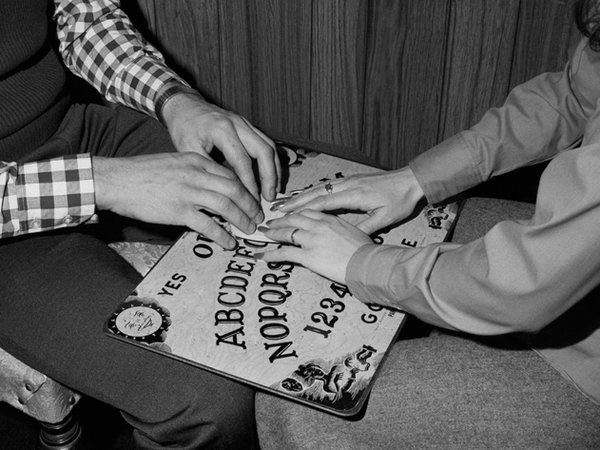Spooky Coordination
April 2, 2025. original tweet thread
If group coordination is the bottleneck for so many problems, then why aren’t we better at it? Well one reason is that the experience of being highly coordinated with others can actually be kinda spooky and unsettling. Weird things can happen that are difficult to explain.
I’ve experienced this myself in the context of comedy improv. It’s actually fairly common. In the 2000’s I took improv classes at Second City and ImprovOlympic (IO) in Chicago. The following quote is from a book by the founders of ImprovOlympic called Truth in Comedy.
The ImprovOlympic workshops constantly prove that a group can achieve powers greater than the individual human mind. Scenes created have turned out to be prophetic, and ESP has actually occurred on stage. Players are able to speak simultaneously, at a normal rate of speed, saying the exact same thing, word for word. Some teams became oracles on stage, answering the great questions of the universe, one word at a time, leaving audiences chilled and astonished.
Audiences have witnessed the group mind linking up to a universal intelligence, enabling them to perform fantastic, sometimes unbelievable feats. It only happens when the group members are finely attuned to each other, but it almost seems like they are tapping into the same universal consciousness that enables individuals with special abilities. Somehow, we are able to connect to it—and all improvisers know the value of connections!
You may have experienced similar things in your own life. Sometimes it happens in a religious or spiritual context, e.g. multiplayer meditation as taught by Vince Horn.
Ouija boards are associated with the occult because when it works (and it often does) it’s hard to explain how without appealing to something supernatural. But there are prosaic non-spooky explanations that I think account for the evidence pretty well.

As an example, in the story of the blind men and the elephant, none of the blind men believe that what they are sensing is an elephant. However it is possible to aggregate their perceptions such that the group does recognize it as an elephant. If the blind men had used approval voting, for example, they would have realized it was an elephant.
In other words, it’s possible for the group to arrive at the correct answer even when all the individual members are wrong. The group is more intelligent than its members.
Now consider what happens when there are feedback loops, when members of the group learn from the group itself. The group makes its members more intelligent, and the members make the group more intelligent. If this feedback loop happens very rapidly, things get spooky.
To take it even further, the group can discover “free lunch” patterns as described by Michael Levin in his paper on ingressing minds. If the individual members don’t recognize the patterns that the group is utilizing, it can seem like magic.
An unfortunate side effect of this is that people can get freaked out and choose (perhaps unconsciously) to avoid situations where this phenomenon might occur. If people can’t make sense of it, they sometimes choose to block it out in order to escape the cognitive dissonance.
This is why I believe we as a society need to embrace the woo, but also hold our beliefs loosely and have a sense of humor about it. We need to be open to experiences we can’t make sense of in order to solve problems that none of us know how to solve.